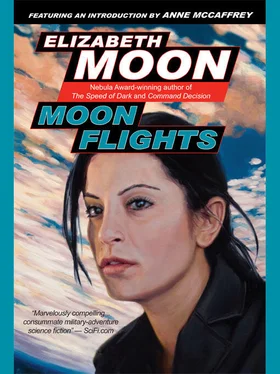The med tech was smiling now, and even brought him a hot drink from the dispenser. “Here. You’ll feel better soon. Shall I tell the captain you’ll be eating with crew today?”
He nodded, gulping down the green pill in the packet with a bitter cup of Estrain tea.
He showered and changed for the next meal, unsure which it would be, and walked into the crew mess to find himself confronted with piles of sweet ration squares and fruit mush. He forced himself to smile again. He had hoped for midmeal or latemeal, when the ration squares were flavored like stew of various kinds. Sweets made his head ache. But the med tech, halfway around the ring, waved to him, and Mantenon edged past others to his side.
The yellow ones aren’t sweet,” the med tech said. He handed over a yellow square and a bowl of mush. “You’ll like it better than the brown ones.”
Mantenon found the yellow squares similar to the ones he had had delivered to his suite: those were orange, but the taste was the same, or nearly so. He ate two yellow squares while listening to the others talk. None of it made sense to him. It was all gossip about crewmembers—who was sleeping with whom, or having trouble with a supervisor—or tech talk, full of numbers and strange words. Finally someone across the ring spoke to him, in a tone which seemed to carry humor.
“Well, Mr. Mantenon—how’s your music coming?”
He choked on his bite of ration, swallowed carefully, and folded his hands politely to answer.
“It’s… well, it’s coming. It’s still unsettled.”
“Unsettled?” The questioner, Mantenon now realized, was the same stocky woman he’d seen earlier in the lounge.
“Yes, it—” His hands began to wave as he talked, mimicking their movements on the Meirinhoff. “It’s got some good themes, now, but the overall structure isn’t settled yet.”
“Don’t you plan the structure first?” asked someone else, a tall person with two green braids on his collar. “I would think rational planning would be necessary…”
Mantenon smiled. “Sir, your pardon, but it is not the way creative artists work. We are taught to respond to a stimulus freely, with no preconceptions of what form might be best. When we have all the responses, then we shape those into whatever structure the music itself will bear.”
“But how do you know…?”
“That’s what our training is for.” He dipped a bite of fruit mush, swallowed it, and went on. “Once we have the responses, then our training shows us what structure is best for it.”
The tall man frowned. “I would have thought the stimulus would determine the correct structure… surely anything as large as a planet would call for a serious, major work—”
“Oh no, Kiry!” That was a young woman who hadn’t spoken before. “Don’t you remember Asa’s Dream? It’s just that short, poignant dance, and yet the planet was that big pair of gas giants over in Harker’s Domain. I’ve seen a cube of them: it’s perfect.”
“Or the truly sinister first movement of Manoken’s 5th Symphony,” said Mantenon, regaining control of his audience. “That was not even a planet… he wrote that it was inspired by the reflections of light on the inside of his sleepcase.” They all chuckled, some more brightly than others, and Mantenon finished his breakfast. The med tech seemed to be watching him, but he expected that.
That day he incorporated the bits he’d scored in the crew lounge—the “anger movement” as he thought of it—into his main piece. It was the planet’s response to the insult of his initial crunch; for a moment he wondered about himself, imputing emotions to planets, but decided that it was normal for an artist. He wouldn’t tell Med about it. And at latemeal, several crew chose to sit near him, including him casually in their chatter with questions about well-known pieces of music and performers. He felt much better.
Still, when he decided, several days later, that his composition was complete and adequate, he had his doubts. The planet was ugly. Had he really made something beautiful out of it—and if he had, was he rendering (as he was sworn to do) its essential nature? Would someone else, seeing that planet after hearing his music, feel that it fit? Or would that future hearer laugh?
That doubt kept him doodling at the console another few days, making minute changes in the scoring, and then changing them back. He spent one whole working shift rooting through the music references he’d brought along, checking his work as if he were analyzing someone else’s. But that told him only what he already knew: it had a somewhat unconventional structure (but not wildly so), it was playable by any standard orchestra (as defined by the Musicians Union), it could be adapted for student or limited orchestras (for which he would earn a bonus), none of the instruments were required to play near their limits. It would classify as moderately difficult to play, and difficult to conduct, and it contained all the recommended sections for a qualification work (another bonus): changes in tempo, changes from simple to complex harmonics, direct and indirect key changes.
He played it back, into the headphones, with full orchestration, and shook his head. It was what it was, and either it would do, or it wouldn’t. And this time he could not depend on a panel of professors to check his work and screen out anything unworthy. This time, if he judged it wrongly, the whole CUG system would know. He frowned, but finally reached for one of the unused memory cubes and slid it into place. And punched the controls for “Final Record: Seal/No Recall.” It was done.
With the cube in hand, and the backup cubes in his personal lockbin, he made his way to the lounge area once more. The curtains were drawn; the captain sat on one of the couches. He opened his mouth, and realized that she already knew he’d finished. Security must keep a closer watch on musicians than he’d thought. He wondered if they’d listened to his music as well… he’d been told that no one did, without permission of the artist, but Security was everywhere.
The captain smiled. “Well—and so you’ve finished, Mr. Mantenon. And we’ve not heard it yet…”
“Do—do you want to?” He felt himself blushing again, and hated it. Yet he wanted her to hear the music, wanted her to be swept away by it, to see and feel what he had seen and felt about that planet.
“It would be an honor,” she said. He watched the flicker of her eyelid. Was it amusement? Weariness? Or genuine interest? He couldn’t tell. He wavered, but finally his eagerness overcame him, and he handed her the cube.
“Here,” he said. “It runs about twenty-nine, Standard.”
“So much work for this,” she said, with no irony, holding the cube carefully above the slot. “Twenty-nine minutes of music from—how many weeks of work?”
He couldn’t remember, and didn’t care. Now that she held it, he wanted her to go on and play the thing. He had to see her reaction, good or bad, had to know whether he’d truly finished. “Go on,” he said, and then remembered that she was the captain. “If you want to.” She smiled again.
Played on the lounge sound system, it was different, changed by the room’s acoustics and the less agile speakers which were not meant to have the precision of the Meirinhoff’s wave generators. Even so, and even with the volume held down, Mantenon thought it was good. And so, evidently, did the captain; he had been taught to notice the reactions of the audience to both live and replayed performances. Smiles could be faked, but not the minute changes in posture, in breathing, even pulse rate that powerful music evoked. In the final version, his original reaction framed the whole composition, the crunch split, literally, in mid-dissonance, and the interstice filled with the reaction, counterreaction, interplay of themes and melodies. Then the crunch again, cutting off all discussion, and the final splatter of the seeds—the moons. As the cube ended, Mantenon waited tensely for the captain’s reaction.
Читать дальше











